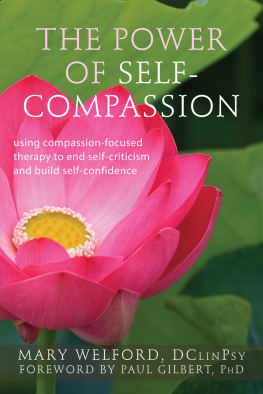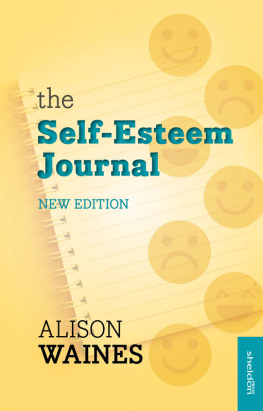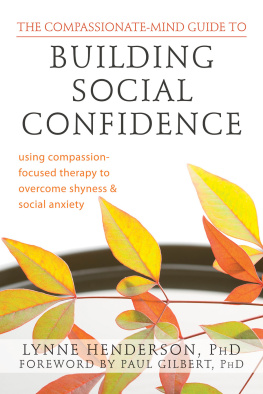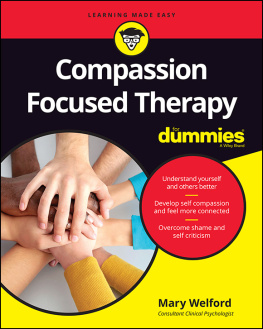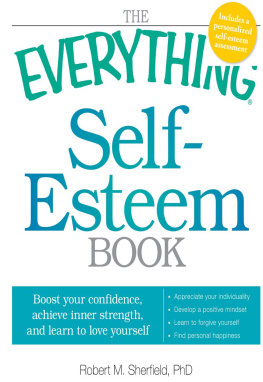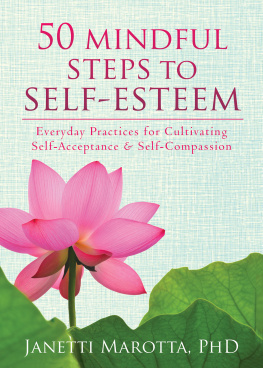
Mary Welford, DClinPsy, is a consultant clinical psychologist who lives and works in the South West of England. She is a founding member of the Compassionate Mind Foundation, and she has been involved in the British Association for Behavioural and Cognitive Psychotherapies (BABCP) for several years. Working alongside Paul Gilbert, she helped to develop compassion-focused therapy (CFT).
Foreword writer Paul Gilbert, PhD, is a professor at the University of Derby in the United Kingdom. In addition, he is the director of the Mental Health Research Unit at Derbyshire Mental Health Trust, the founder of compassion-focused therapy (CFT), and the author of The Compassionate Mind.
This book will help you stop undermining yourself with debilitating self-criticism and start giving yourself the same kindness, encouragement, and support youd give to a good friend. With straightforward explanations of concepts and dozens of easy and practical exercises to build self-confidence through self-compassion, this book has the power to change your life.
Kristin Neff, PhD, author of Self-Compassion and associate professor, University of Texas at Austin
Compassionate Mind approaches are one of the most exciting developments in cognitive behavior therapy. Mary Welford has written an easy-to-read interactive book that distils the core features of developing a different relationship with ones mind and paradoxically building ones self-confidence.
Professor David Veale, Institute of Psychiatry, Kings College London
Hugely approachable, sympathetic, and fun. Id recommend this book to anyone wanting to improve their self-confidence. Choc-full of brilliant clinical metaphors and creative techniques, it will also be invaluable to any therapist wanting a primer on this fascinating area.
Sam Cartwright-Hatton, clinical psychologist and NIHR fellow, University of Sussex
This is a wonderful book! Welford has beautifully written a remarkable book that takes us to the heart of building self-confidence through developing self-compassion. This book is based on a robust science of mind that leads directly to sensitive and kind-hearted understanding of how we develop self-critical ways of coping with difficult and stressful life experiences. This book enables you to develop an empathic understanding of the origins of shame and also provides practical skills and techniques in developing a compassionate mind as the basis for self-confidence. This book is a highly accessible and practically useful means of developing and overcoming obstacles to self-compassion.
Professor Andrew Gumley, University of Glasgow, UK
Mary Welfords book is helpful, informative, and interesting. The book makes you feel very much looked after and the inclusion of personal stories, including her own, gives the reader a sense of not being on their own. The approach is hugely relevant to those wishing to find their compassionate self and build their self-confidence.
Erica Wakeman, reader

Publishers Note
This publication is designed to provide accurate and authoritative information in regard to the subject matter covered. It is sold with the understanding that the publisher is not engaged in rendering psychological, financial, legal, or other professional services. If expert assistance or counseling is needed, the services of a competent professional should be sought.
Distributed in Canada by Raincoast Books
Copyright 2013 by Mary Welford
New Harbinger Publications, Inc.
5674 Shattuck Avenue
Oakland, CA 94609
www.newharbinger.com
First published in the UK by Constable. An imprint of Constable & Robinson Ltd.
Cover design by Amy Shoup
Acquired by Tesilya Hanauer
Edited by Brady Kahn
All Rights Reserved
Library of Congress Cataloging in Publication Data
Welford, Mary.
The power of self-compassion : using compassion-focused therapy to end self-criticism and build self-confidence / Mary Welford, DClinPsy.
pages cm. -- (The New Harbinger compassion-focused therapy series)
Includes bibliographical references.
ISBN 978-1-57224-983-7 (pbk. : alk. paper) 1. Self-esteem. 2. Compassion--Psychological aspects. 3. Self-confidence. 4. Emotion-focused therapy. I. Title.
BF697.5.S46W435 2013
158.1--dc23
2012034631
Contents
Foreword
Its long been understood that compassion is very important. The way we feel about ourselves and the way we think other people feel about us has a huge impact on our well-being. If we value and support ourselves, we are more likely to successfully negotiate all that life throws at us. This is in contrast to being self-critical and feeling that theres something wrong with us. However, it is not just common sense that tells us about the value of compassion. Recent advances in scientific studies have greatly advanced our understanding of how compassion, both from ourselves and from others, can help us to treat ourselves in ways that are respectful and improve our sense of well-being.
We live in a world where we are constantly advised to judge, rate, and evaluate ourselves. All around us are messages that we might not be good enough. Maybe our parents told us such things, or maybe at school we were often the last to be picked for the team. Of course, nowadays schools are constantly focused on tests, judgments, and evaluations of all kinds. Over the last ten to twenty years, even competitions on television have become increasingly focused on which contestant will be thrown off the show. From Big Brother to cookery competitions, we see people anxiously waiting to find out if they will be the one voted off, the camera following those recently ejected in their tearful departures. This may well be good for television, but it doesnt do a lot for our psychological well-being. It fosters the old view that only success and achieving and doing things can make us happy, and if we are not up to scratch or if we do something wrong, then we too will feel anxious, unhappy, and tearful. So it doesnt take much to recognize that our sense of belonging and community can be a lot more fragile than it used to be. Indeed, our focus on self-esteem and achievement, at the expense of helping, sharing, and nurturing our community, has been offered as one reason depression and anxiety are on the increase in the modern world, especially among younger people.
What research tells us, however, is that if we learn to value and respect ourselves, if we treat ourselves and others with kindness even when things are going wrong, we are much more likely to be able to cope with setbacks and be happier. While striving for success is important, seeking to be compassionate to yourself and to others has been shown time and again to be associated with a sense of well-being. After all, its easy to become critical, harsh, and rejecting when things go wrong, but the real measure of ourselves is whether we can be supportive and encouraging when life is tough.
In this important book, Dr. Mary Welford uses her wealth of experience and knowledge in working with people with a whole range of psychological difficulties. She explores why our brains are so susceptible to reacting to lifes setbacks and difficulties in the way that they do and especially why we have a tendency to judge ourselves and be self-critical. Unlike other animals, you have a brain that is constantly thinking and judging. Imagine a zebra running away from a lion. Once the zebra has escaped, it will shortly settle down to feed again. However, we humans can spend many days ruminating about what would have happened if wed gotten caught and fantasizing about the most horrible things. Zebras and chimpanzees dont worry about what theyre thinking, what they look like, or what other zebras or chimpanzees might be thinking about them! Humans, on the other hand, doand all the time! We look in the mirror and think,

